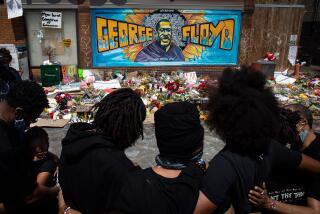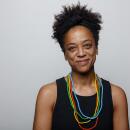Review: What’s missing from this book? Pioneering black feminist Flo Kennedy’s blazing personality
- Share via
A super badass and wildly underrated woman known for her dazzling sense of style and sharp wit, radical black feminist activist Flo Kennedy seems like the ideal biography subject. It would be near impossible to paint a pale portrait of her.
But “Florynce ‘Flo’ Kennedy: The Life of a Black Feminist Radical,” clearly well researched, reads more like an academic textbook than the rich and lyrical account one might hope for. However, even if the writing doesn’t sing, it remains a valuable account of this lesser-known, entirely remarkable woman.
Born in 1916 the second of five daughters, Florynce Rae Kennedy grew up in Kansas City, Mo., with parents Wiley and Zella Kennedy in a house they owned, in a neighborhood where they were not welcome, and where, according to family lore, they were confronted by an angry white mob after they moved into the predominantly white area.
As Kennedy told it, her parents were defiant in the face of injustice and encouraged the same in their children, but as a family, the famously profane Kennedy said, they were political only “in the sense that we never took any ... .” This attitude permeated their lives in ways both remarkable and surprising. Zella, whom Kennedy described as “awfully smart,” believed in teaching her daughters about sexual freedom and individual autonomy and insisted that all forms of exploration — drinking, smoking, sexuality — be done with full transparency. “I never remember punishment over sexuality, and since neither doing wrong nor admitting it ever brought punishment, it was not difficult for me to tend to try (a) not to do something wrong, and (b) not to deny I did it,” Kennedy recalled. Another time, she explained, “Hell, we’d be doing it with fellows on the front porch, but my mother completely absented herself.”
So although there was no formal effort to instill a sense of radicalism or political ideology, the way in which her family lived and respected one another informed Kennedy’s decision to dedicate her life to fighting racism and sexism.
In 1943, after a nonviolent protest staged by Kennedy and her sister Grayce at a bus stop cafe that refused to served “coloreds” — and left Flo, who was yanked from her seat, with a lifelong spinal injury — the two moved to New York City. They settled in Harlem, where Flo learned about Adam Clayton Powell Jr., then the senior pastor of Abyssinian Baptist Church, whom she described as “right down my protest alley.”
Through her alliance with Powell and with the help of his lawyer, Kennedy sued the cafe and bus company in Missouri for the racial assault and won. Seeing how the courts could help in the overarching fight against racial discrimination, Kennedy applied and was accepted to Columbia University, where she studied pre-law. This was no small feat for an African American woman in 1945 but just one of many moments throughout her life when Kennedy defied the odds.
Kennedy said she “didn’t feel particularly black” when she started at Columbia. What did that mean to her? Unfortunately, Randolph doesn’t dig into the racial and cultural makeup of Kennedy’s personal landscape. How much of “not feeling black” allowed her to be black in all-white environments? How does one not feel black and yet challenge and endure often violent racial discrimination and racism?
She did face racism: her application to Columbia Law School was originally turned down, but she challenged the rejection on the basis of discrimination and was ultimately admitted. She practiced law for several years before deciding that “the law was used to maintain the ... rather than to change things, that justice was really a crock of ....”
Around this time, Kennedy fell for Charlie Dye, a white science fiction writer with a drinking problem. They were married in the Upper West Side apartment of musician Leonard Cohen, a friend of Dye’s. At this point in the book, you might start to think, did Kennedy ever hang out with any black people? By this account, not really.
It wasn’t until she took on Billie Holiday as a client in a high-profile case against Holiday’s management company and record label that Kennedy started to broaden her scope — she referred to the case as her “true initiation into the black community.” Before that, Kennedy admitted, she “hardly knew any black people.”
Rather than delving further into this admission, Randolph tries to assure us that Kennedy was a “bridge builder” trying to infiltrate white spaces, introducing race and intersectionality to the broader feminist movement. I’ve no doubt this is true, and I applaud Kennedy for it — indeed, Gloria Steinem, her frequent speaking partner during the 1970s, applauded her for it — but I am left curious as to how it felt to have grown up in such a tightly knit black family and then intentionally surround herself with white people for much of her adult life.
Nevertheless, Kennedy fought fervently for the rights of black women and against racism and sexism in mass media, working with other leading black feminist activists Dorothy Height, Fannie Lou Hamer and Shirley Chisholm. She identified the black power and liberation movement as “the vanguard movement of all oppressed people,” Randolph writes, “and believed that coalitions between blacks and other oppressed groups were necessary to help speed revolutionary change.” Kennedy, a co-founder of the National Organization for Women, was deeply critical of white feminists who worked with black feminists only when they needed them.
Kennedy hosted regular salons at her Manhattan apartment with black feminist women, but she was heavily invested in maintaining her individual autonomy — she often galvanized folks and then got them out. Once, losing patience, she cried, “I’m so sick and damn tired of hearing you bitches running around here, talking about you’re going to form something. Form it! Call a meeting!” And so the relatively short-lived National Black Feminist Organization was born.
Randolph writes, “Kennedy’s black feminist politics championed more than the identities she embodied. The ‘we’ was expansive, for it included more than the many different groups that were marginalized by the dominant structures of economic and political power.” This is the key to how exceptional Kennedy, who died in 2000 at age 84, was as an activist — but the person she was remains elusive.
I still know nothing about where she shopped for her signature cowboy hats, where she got her famous shiny red nails did, what she ate, how she loved, what she read, who inspired her, or what made her laugh. This book would have her remembered for what she did rather than who she was.
::
Florynce ‘Flo’ Kennedy: The Life of a Black Feminist Radical
Sherie M. Randolph
University of North Carolina Press: 328 pp., $30
Carroll is the author of five books, including “Saving the Race: Conversations on Du Bois From a Collective Memoir of Souls.”
More to Read
Sign up for our Book Club newsletter
Get the latest news, events and more from the Los Angeles Times Book Club, and help us get L.A. reading and talking.
You may occasionally receive promotional content from the Los Angeles Times.







